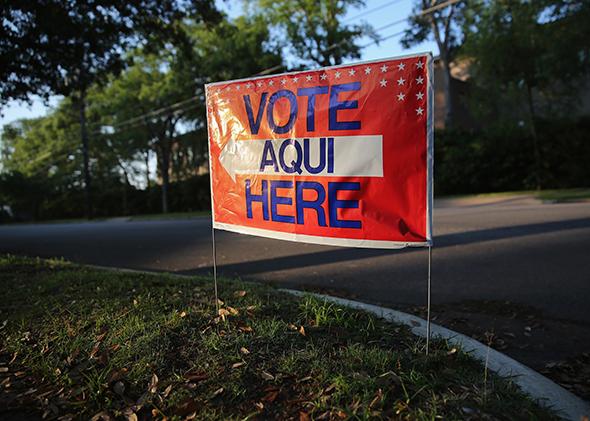Last year, in a rare moment of political lucidity, Republicans gave themselves good advice on appealing to Latino voters. “If Hispanic Americans hear that the GOP doesn’t want them in the United States, they won’t pay attention to our next sentence … they will close their ears to our policies,” wrote the Republican National Committee in its Growth and Opportunity Project report. “[O]ur Party’s position on immigration has become a litmus test,” it continued, “measuring whether we are meeting them with a welcome mat or a closed door.” Republicans had to solve the immigration problem in order to move forward.
And for a few months, it looked possible. Florida Sen. Marco Rubio spearheaded a comprehensive immigration bill, lobbying conservative activists and successfully moving it out of the Senate.
Almost immediately, however, the party’s right-wing base reasserted itself. House Republicans railed against the measure, rejecting the path to citizenship and demanding more funding for security at the border. Negotiation turned to intransigence, and last fall, fierce conservative anger led a desperate Rubio to abandon the bill and come out against comprehensive reform. By the end of the year, reform was nearly dead, with tough, if any, odds for progress.
In other words, Republicans knew what they had to do to make an appeal to Latino voters. But rather than follow their own prescription and embrace a new approach, they splurged on their old habits, binging on anti-immigrant rhetoric and indulging their worst nativist instincts. Indeed, the past few months have seen Republicans come unhinged at the mass arrival of child migrants and refugees from central America, with warnings of disease and mayhem.
But politicians are nothing if not optimistic, and the GOP is giving Latino outreach another shot. The new plan is to ignore immigration and try to bridge the gap with economic issues. In an NPR interview last week, Rubio told host Steve Inskeep, “The vast majority of a significant portion of Americans of Hispanic descent [who] will vote happen to be working-class people who are desperate to not only achieve the American dream but leave their kids better off than themselves. And they are going to vote for the political movement and the candidates who they believe understand what they’re facing and have real ideas to help them.”
As Josh Kraushaar explains for National Journal, other Republicans have followed suit:
“Every experience that nearly every American has had during the economic decline—that’s the experience of every immigrant and their children. They leave their country and adopt a new one for that hope for a better economic opportunity,” said Republican strategist Joanna Burgos, a former National Republican Congressional Committee official. “To win over Hispanics, you have to show you’re a candidate that cares about the community. Show they’re a natural part of your campaign, and you’re not just spitting out some talking points to win their votes.”
Borrowing from the George W. Bush playbook, education seems to be key to this new appeal. “It’s no coincidence that in the Florida governor’s race,” Kraushaar notes, “the state Republican Party has aired ads focused on GOP Gov. Rick Scott’s education record, including one with Spanish-speaking female teachers lauding the pay raises he secured.”
All of this is well and good, but it runs into a big problem. The Republican Party’s original analysis was correct. After the RNC released its report, Latino Decisions published a poll on Hispanics, immigration reform, and the GOP. Among all Hispanics, 32 percent were more likely to vote Republican in the future if comprehensive immigration reform passed. What’s more, a later Latino Decisions poll—this time of Latino registered voters—found that 61 percent would be more likely to listen to Republicans on issues like taxes or school choice if the party supported reform.
Barring a major shift in Latino public opinion, there’s little chance this has changed in recent months. Immigration remains an important variable for Latino voters. That’s not to say it’s the top concern—there’s survey data to the contrary—but it’s a key symbolic concern, a measure of a party’s commitment to a full and inclusive government. Put another way, it’s no accident that only 12 percent of Hispanics associated the phrase “cares about people like you” with the Republican Party, according to a September 2013 survey from the Public Religion Research Institute. (In the same poll, 48 percent of Hispanics attribute “negative associations” to the GOP.)
I understand the GOP’s predicament. It wants a larger portion of the Latino vote—lest it be crippled in future national elections—but it doesn’t want to pass immigration reform, lest it alienate core supporters. But there are no shortcuts to building respect and goodwill. If Republicans want more than a rump share of Latino voters, they’ll need to shift on immigration reform. Otherwise, they should expect Latinos to meet them with a “closed door.”
